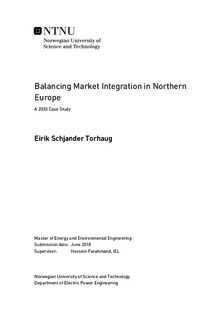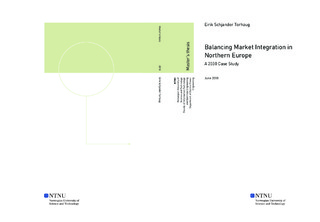| dc.description.abstract | The future European power system is expected to incorporate a large share of renewable energy sources (RES). The intermittent nature of these sources will require a higher degree of flexible generation, thus increasing the need for reserve capacity providing balancing energy. In light of this the balancing market is predicted to play an increasingly important role in the future. European balancing markets are largely national markets, but because of the potential increase in system reliability and decrease in balancing costs associated with cross-border balancing, a fully integrated European balancing market is a target goal set out by the European Commission.
This thesis applies a flow-based Frequency Restoration Reserve (FRR) procurement model to a Northern European power system consisting of the Nordic countries, Germany, the Netherlands and Great Britain in a future 2030 scenario with a high share of renewables. The model clears a common day-ahead market, with FRR requirements as constraints. Transmission capacity is implicitly allocated with the same resolution as the clearing of the day-ahead market. A comparison between a non-integrated and fully integrated FRR procurement market focusing on the total system costs is conducted.
The results show that integration of FRR procurement markets leads to a decrease in total system costs of 4.8$\%$, compared to the non-integrated case. This cost reduction is due to two factors. First, integration leads to the procurement of cheaper FRR resources. The availability of the cheap hydro power resources of the Nordic countries is the main reason for the reduction in procurement costs. Second, the increased flexibility in generation capacity due to integration also leads to less load shedding and unprovided FRR in the system, reducing costs substantially. The insufficiency of FRR capacity observed in Great Britain in the non-integrated case, and the significant exchange of FRR from the Nordic region to Great Britain in the integrated case indicates that Nordic hydro power can play an important role in providing the British system with reserves in the future. | |

